|
SATURDAY EDITION April 19th, 2025 |
|
Home :: Archives :: Contact |
 |
Gold & OilEric HommelbergAugust 21st, 2005 This piece is an update on chapter VIII Gold & Oil of the Gold Drivers Report. Oil is getting more and more media attention lately since its price is heading high into the stratosphere and poised to launch for the moon... At least that's what oil expert Matthew Simmons wants us to believe. Now why oil is heading to such highs you wonder, is it because of Middle East tension? Is it because of Saudi Arabia's king Fahd death (uncertainty about next regime and terrorist threats )? Or could it very well be that industry experts such as Matthew Simmons, Colin Campbell, Kenneth Deffeyes were right all along and that planet earth has approached the peak in world-oil production? Or even worse, could it be that we are at the verge of world peak production here and now? And if that's the case why is it so important to the future prospects of gold? The Gold/Oil ratio tool says that gold is way undervalued compared to gold but is it still a valid tool (many analysts are pointing to the Gold/Oil ratio and argue that this ratio has dropped to such an extreme that buyers of gold could be very well on the right side of the trade for next coming years if oil prices do not come down) or has it lost its credibility? Does it make sense anyhow to compare a commodity which will be consumed to zero over time with a commodity which is only being accumulated over time? Enough questions here. I'll address them in two parts:
PEAK-OIL: bunch of alarmist speaking? OPEC to the rescue? Since this is an update on chapter VIII Gold & Oil let's first start off with the chapter's highlights and see what ever happened next: Highlights chapter VIII Gold & Oil
Now fast forward to August 2005, are there any signs of relief? Can OPEC live up to its expectation to increase oil production substantially? Can Saudi Arabia double its oil production to 20-25 million barrel/day (compared to less than 10 million barrels a day now) as they said they could? Is Matthew Simmons still convinced of his own dire predictions made earlier this year? What do the optimists say? Let's start with the optimistic scenario. This scenario forecasts Saudi oil production of 20-25 million barrels a day within the next two to three decades. This scenario is backed by US government energy planners and the International Energy Agency. Now Matthew Simmons says that that is impossible, he says that Saudi Arabia could never grow above its current production level (10 million barrels a day) since he believes that Saudi Arabia already exceeded its sustainable peak oil production. Now who is wrong and who is right will be answered by Mr. Time. In other words, even when Matthew Simmons is right, we'll never know until several years from now. The same can be applied for the optimists. We'll never know if they are right since all information regarding the contribution that each oil field makes to the reported 261 billion barrels of proven Saudi oil reserves is treated as a state secret... Matthew Simmons just released his new book 'Twilight in the Desert - the coming Saudi Oil Shock and the World Economy -) in which he presents a powerful case for Saudi Arabia nearing its sustainable peak oil production fast. Simmons sounds very convinced. He says:
During an on-line Q & A session with the Washington Post (Aug 04) Simmons was asked about his opinion regarding Saudi Arabia's high volume output. He replied:
A few days later (August 6) Simmons did an interview with Jim Puplava (Financial Sense News hour) and Simmons repeated his dire prediction using even stronger words;
Well, not a pretty picture indeed! But wait, what about the Cambridge Energy Research Associate's analysis? They project a less urgent picture and plenty of oil for the next coming years. When asked about this report Matt Simmons replied:
OK, but what about OPEC? Didn't they assure us to increase oil production substantially if necessary? Indeed they did but where do you think this oil should come from? Indeed, Saudi Arabia is considered to be the only oil producing country which could increase its oil production substantially to meet world demand. And yes, many economists assume that Saudi Arabia could double its oil production during the next 15 years. Simmons says that's impossible since he believes that Saudi Arabia already exceeded sustainable peak oil production. Now please be aware that Simmons is not the only one playing the shortage tune, even some Saudi energy officials admit that meeting future demand will be"extremely difficult". The Financial Times reported on July 6, 2005:
So there it is,"meeting future demand will be extremely difficult" Again, nobody can tell with any certainty when peak-oil will arrive but to me it's clear that when 4 out 5 of major oil companies are showing a decline in their oil production it certainly doesn't contradict Simmons statements... Just take peek at the production decline of the major oil companies over the first 6 month of 2005: Oil production first 6 month 2005 Chevron: -6% This should be a wake up call for the investor but ignorance seems to be the tune of the day. One investor however who does take these figures seriously is 77 year old oil tycoon Boone Pickens, chairman of BP Capital Management, a billion-dollar hedge fund focused on energy commodities. He thinks that world oil production peak is near and he sees no other direction for oil-prices to go other than up! Boone Pickens Sees Oil Prices Going Higher Riding High on Crude Futures, Oil Tycoon Boone Pickens Sees Prices Going Even Higher
Now that the awareness is growing that the end of cheap oil has arrived it could be paying off to examine the gold/oil ratio chart again. Many analysts are pointing to the Gold/Oil ratio and argue that this ratio has dropped to such an extreme that buyers of gold could be very well on the right side of the trade for next coming years if oil prices do not come down. So when oil doesn't come down gold should be catching up right? The historical gold/oil ratio suggest a gold price far above $700 these days. Is it really that simple? After writing chapter VIII Gold & Oil I received plenty of critics indeed form people arguing that you can't compare a commodity (oil) which will be consumed to zero over time with a commodity (gold) which is only being accumulated over time. Since that critic is getting louder these days I'll try to explain why I think that oil does matter to gold. Gold/Oil ratio: why oil does matter for gold! Please keep in mind that I'm not preaching higher gold prices just because of rising oil prices. Gold & Oil is just one single chapter of the Gold drivers report and oil is just one of the critical drivers for gold but not the leading one. Therefore I've made some referrals to other chapters of the report as well because it's the big picture what counts and oil is just a part of that picture. Now in order to shine a light on the validity of the gold/oil ratio I would like to answer the following question which I got from a well known hedge-fund. Question:
Answer: First of all it's almost impossible to determine what a ratio SHOULD be. All we can do (and that's what I did) is to determine historical averages. We're talking about 35 year averages and those averages are suggesting a Gold/Oil ratio of 16:1 , not 8:1. Of course one could argue that the historical average from 1970 till 2001 was wrong (16:1) and the current one is right (8:1) but that would be the same analogy as saying that today's oil prices are normal while the average oil prices of the past 30-years were too cheap. In order to find out what makes sense and what doesn't we should try to figure out why this historical average is 16:1 and what kind of relation there is between oil and gold (if there is any). Some analysts claim that it just doesn't make sense at all to compare gold and oil since oil is an item which is being consumed at a very rapid pace and its reserves will dwindle down to zero over time while gold on the other hand is an item which is NOT being consumed at all but accumulated only so its above ground stock-pile will continue to increase over time. So therefore you can't compare gold to oil and a gold/oil ratio doesn't make any sense at all they claim. Although this seems a logical explanation I couldn't disagree more. It's a far more complex issue than a simple commodity being consumed (oil). The thing is that oil is so extremely important for our entire society and well-being that without oil (or a lack of oil) our society would plunge back into 19th century living standards. Oil is as important for our entire society as water for a human being. No water no life, no oil no flourishing society, it's that simple. A human being can survive two days without drinking water but needless to say that person would feel terrible and certainly not in shape to qualify for the Olympic trials. Same analogy can be applied to the world economy, for sure we would survive a cut-back in oil supplies (for whatever reason, PEAK-OIL, Middle-East War, lack of refinery capacity etc..) but please forget about economic growth. Not one serious economist believes that you can have significant economic growth without the availability of cheap energy since economic growth has always been fueled by cheap fossil fuel energy. And yes, a lack of cheap fossil fuel energy has always led to economic slowdowns in the past, (see also Stephen Leeb's Oil Indicator described in chapter VIII Gold & Oil) So when we're entering a time of rising energy prices it automatically means we're entering a time of economic slowdown. Now here's where gold comes into the picture. There're times when it's good to buy financial assets (economic booms) and there're times when it's good to buy real assets (economic weakness) as a protection of wealth. The 1968 - 1980 period showed a poor return on financial assets (DJIA 1000 pts in 1968, DJIA still 1000 pts in 1980) while commodities and precious metals were booming (Gold rose from $35 in 1968 to $850 in 1980). The 1980- 2000 period showed an inversed picture, good returns on financial assets (DJIA rose from 1000 pts in 1980 to almost 12.000 pts in 2000), poor returns on commodities/precious metals, Gold dropped from $850 in 1980 to $250 in 2001) The chart which makes this painfully clear is the DOW/GOLD ratio chart. 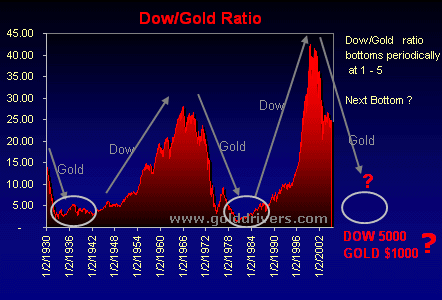 DOW/GOLD ratio. More detailed explanation see: Gold & Historical Norm Conclusion:
So that's the big picture over a multi-decade time-frame, but what about the gold-oil relation on a smaller time-scale, is there a correlation indeed? Well, let's start off by examining the correlation between gold and oil itself. In order to do so I've charted gold against oil in 2005 dollars. Please take peek at the Gold vs Oil chart below and see how stunning the correlation really is. 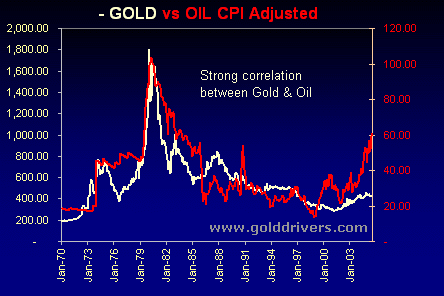 No matter how you look at this chart, you simply can't deny a very strong correlation between gold and oil. A strong correlation means a constant ratio which happens to be 16:1 over the last 35 years. Now at the end of this chart you'll notice that gold is lagging the price of oil. According to this chart a price of gold exceeding $800 dollars shouldn't be categorized as 'abnormal'. This becomes more evident when looking at the Gold/Oil ratio chart. 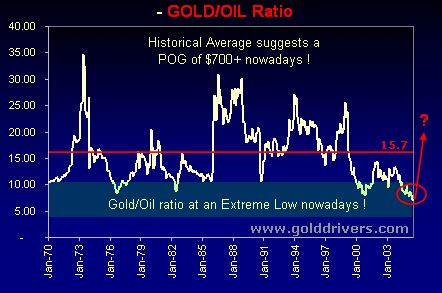 Now that we've seen how important oil is for our entire society and what rising oil prices could do to the economy and what consequences that could have on gold let's try to focus more on the immediate consequences of rising oil prices. Again, let me state that things are far more complicated than a simple commodity rising in price due to its own scarcity. We're living in an oil based society, almost everything you see around has its roots in oil. More than 80% of all manufactured goods are indirectly oil-related. The cost of food-production is oil related (pesticides, fertilizers, transport...), the list goes on and on so it ain't hard to understand that rising oil prices will cause a general price increases for tonnes of stuff thereby fueling inflation. In fact the latest PPI report confirms that inflation is picking up steam due to higher energy prices..
So if higher energy costs do cause inflation we should expect a strong correlation between historic oil and inflation numbers right? Well, I've charted the oil price vs the inflation rate since 1970 and judge yourself, see chart below: 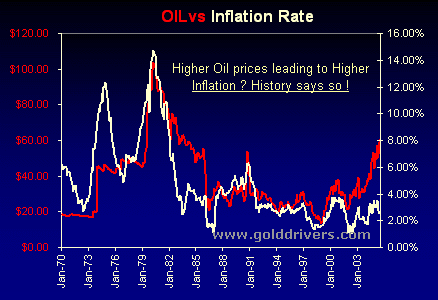 This chart shows a strong correlation between oil and inflation, the only anomaly we see is during the last couple of years where inflation didn't catch up with sharp rising oil prices. Inflation will catch up sooner or later since oil prices aren't likely to come down. The funny thing is however that inflation is picking up steam already but it just isn't being reported by government. The government insists that there is NO INFLATION. They (government) even manage to come up with declining gasoline prices in their CPI statistics month after month in the face of sky-rocketing oil prices. Needless to say this is raising many eyebrows among respected market observers (eg PIMCO's Bill Gross), see also Chapter III Gold & Inflation. Now that we've seen a strong correlation between rising oil prices and inflation let's have look at the correlation between inflation and gold. Is gold the ultimate hedge against inflation? Is there a strong correlation indeed? Well, just take peek at the chart below and judge yourself: 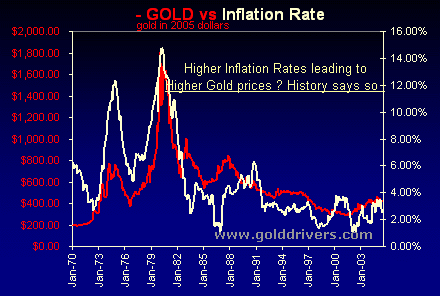 This chart proves beyond any doubt that there's a strong correlation indeed between gold and inflation. Highlights:
Comments and feedback are welcome at: ehommelberg@golddrivers.com NOTE: readers interested in future GDR updates can drop a mail Aug 18, 2005 Gold Drivers Report Summary |
| Home :: Archives :: Contact |
SATURDAY EDITION April 19th, 2025 © 2025 321energy.com |
|